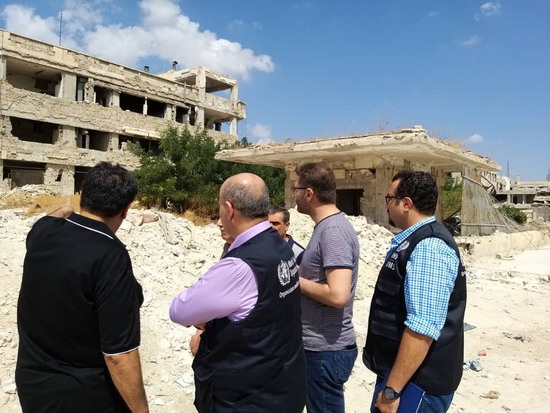
12 September 2019 – The World Health Organization (WHO) extends its gratitude to the People of Japan for the generous donation of US$ 5.2 million allocated to equipping the paediatric hospital in the Aleppo governorate and enabling vulnerable families in north, north-west and north-east Syria to have access to proper medical health care services for children. This donation is part of the new Japanese project for the early recovery of East Aleppo, to be implemented in cooperation with the United Nations Development Programme (UNDP), the UN Refugee Agency (UNHCR), and WHO with a total amount of US $11.6 million. The 3 agencies will adopt an "area-based approach" with a focus on East Aleppo in a wide variety of humanitarian assistance, from supporting local community centres, rehabilitating the paediatric hospital, and strengthening local livelihoods.
Once the paediatric hospital is reactivated, almost 3 million medical services will be provided per year for the children of an estimated half a million returnees to the neighbourhoods of eastern Aleppo and other parts of Aleppo city. People living in more than 150 villages and local communities in the vast eastern rural part of the governorate, as well as the children coming from the governorates of Al Hasskeh, Ar-Raqqa, Deir-ez-Zor and Hama, will also benefit from additional health services.
“The rehabilitation and the equipping of the paediatric hospital represents more than ever a dire need, as it is located in an area which is considered a gateway to and from Aleppo towards the eastern rural areas from which the majority of cases come,” says Dr Safaa, a paediatrician and one of the first doctors to work at the hospital since its establishment.
This generous Japanese donation will help the hospital resume its vital role of providing free health care services and will help vulnerable families of children save a lot of the time and money they spend when taking their children over long distances to be treated in the paediatric hospital in Damascus. It will also reduce pressure on the Damascus hospital, which has been witnessing many patients coming from other governorates.The revival of the paediatric hospital in Aleppo will equally restore hope for thousands of children and their families who often stand helpless amid the most adverse circumstances and deplorable health conditions, leading them to either surrender to illness and death or spend all they have, if any, and travel for long distances to seek treatment opportunities elsewhere.
In recognition of Japanese contributions to the people of Syria, acting WHO Representative Dr Nima Abid commented, “As we enter the ninth year of the crisis, people in Syria continue to face significant challenges that have to be promptly addressed. Japan has been a critical donor for WHO since the beginning of the crisis and we are grateful for their continued support. WHO appreciates the pioneering role Japan is playing in boosting WHO’s humanitarian response in Syria and I am sure that this new fund will contribute to alleviating the suffering of thousands of Syrians and will make a real difference for children and their families who continue to suffer as a result of the ongoing crisis," Dr Nima Abid added.
Once the paediatric hospital in Aleppo is fully implemented in 2 years’ time, it will not only improve access to life-saving health care services for children in the north-western and north-eastern regions in Syria, but will also provide training to the health specialized workforce in Aleppo and surrounding governorates. By virtue of this, the paediatric hospital will represent a model to be emulated for early health recovery in other affected areas across the country.
Based on Health Resources and Service Availability Monitoring System programme at WHO (HeRAMS), the paediatric hospital in Aleppo is the only specialized public hospital in the northern region of Syria with a capacity of 150 beds. The hospital was hit in 2012, leading to vast structural damage and looting of its furniture and equipment.


